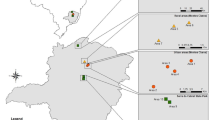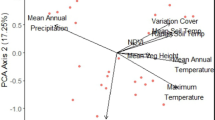Abstract
Whether species diversity contributes to the ecosystem stability has been one of the most heated arguments in community ecology. Potentially different contributions of different ecosystem species have not been explicitly taken into account. With fig species and their associated fig wasp community as model system, we bring community structure into the “diversity-stability” debate by establishing the fig-fig wasp food web model. The simulations of our model indicated that wasp diversity was promoted by population density of the parasitoids of the pollinating wasps, and that top-down control from the parasitoids regulated community diversity and stability. Moreover, only moderate parasitoidism on the pollinators resulted in the regular/irregular oscillatory coexistence in the fig-fig wasp community. Increases in the wasp diversity could increase community stability when biodiversity of fig wasps was low, while population chaos would maintain wasp diversity in the fig-fig wasp system. Our theoretical predictions are consistent with the newest experimental study on the fig-fig wasp system, which showed that loss of top-down control (parasitoidism on the pollinators) resulted in a change in the balance of reciprocal benefits, thereby changing food web complexity.





Similar content being viewed by others
References
Abrams PA (1999) Is predator-mediated coexistence possible in unstable systems? Ecology 80:608–621. https://doi.org/10.2307/176639
Allen JC, Schaffer WM, Rosko D (1993) Chaos reduces species extinction by amplifying local population noise. Nature 364:229–232. https://doi.org/10.1038/364229a0
Borges RM (2016) How to be a fig wasp parasite on the fig-fig wasp mutualism. Curr Opin Insect Sci 8:34–40. https://doi.org/10.1016/j.cois.2015.01.011
Compton SG, Hawkins BA (1992) Determinants of species richness in southern African fig wasp assemblages. Oecologia 91:68–74. https://doi.org/10.1007/BF00317243
Cruaud A et al (2011) Phylogeny and evolution of life-history strategies in the Sycophaginae non-pollinating fig wasps (Hymenoptera, Chalcidoidea). BMC Evol Biol 11:178. https://doi.org/10.1186/1471-2148-11-178
Davidson D, Inouye R, Brown J (1984) Granivory in a desert ecosystem: experimental evidence for indirect facilitation of ants by rodents. Ecology 65:1780–1786. https://doi.org/10.2307/1937774
Donohue I et al (2016) Navigating the complexity of ecological stability. Ecol Lett 19:1172–1185. https://doi.org/10.1111/ele.12648
Ferriere R, Bronstein JL, Rinaldi S, Law R, Gauduchon M (2002) Cheating and the evolutionary stability of mutualisms. Proc R Soc B 269:773–780. https://doi.org/10.1098/rspb.2001.1900
Ferrière R, Gauduchon M, Bronstein JL (2007) Evolution and persistence of obligate mutualists and exploiters: competition for partners and evolutionary immunization. Ecol Lett 10:115–126. https://doi.org/10.1111/j.1461-0248.2006.01008.x
Fussmann GF, Heber G (2002) Food web complexity and chaotic population dynamics. Ecol Lett 5:394–401. https://doi.org/10.1046/j.1461-0248.2002.00329.x
Gravel D, Massol F, Leibold MA (2016) Stability and complexity in model meta-ecosystems. Nat Commun 7:12457. https://doi.org/10.1038/ncomms12457
Greenwood JJ, Elton RA (1979) Analysing experiments on frequency-dependent selection by predators. J Anim Ecol 48:721–737. https://doi.org/10.2307/4192
Guckenheimer J, Holmes P (1983) Nonlinear oscillations, dynamical systems, and bifurcations of vector fields. Springer, New York
Hairston NG, Smith FE, Slobodkin LB (1960) Community structure, population control, and competition. Am Nat 94:421–425. https://doi.org/10.1086/282146
Hardin G (1960) The competitive exclusion principle. Science 131:1292–1297. https://doi.org/10.1126/science.131.3409.1292
Hastings A, McCann KS, PCD R (2016) Introduction to the special issue: theory of food webs. Theor Ecol 9:1–2. https://doi.org/10.1007/s12080-016-0292-1
Herre EA (1985) Sex ratio adjustment in fig wasps. Science 228:896–898. https://doi.org/10.1126/science.228.4701.896
Herre EA (1987) Optimality, plasticity and selective regime in fig wasp sex ratios. Nature 329:627–629. https://doi.org/10.1038/329627a0
Higashi M (1993) extension of niche theory for complex interactions. In: Kawanabe H, Cohen JE, Iwasaki K (eds) Mutualism and Community Organization: Behavioural, Theoretical, and Food-Web Approaches. Oxford University Press, New York, pp 311–322
Holland JN, DeAngelis DL (2010) A consumer-resource approach to the density-dependent population dynamics of mutualism. Ecology 91:1286–1295. https://doi.org/10.1890/09-1163.1
Ishii Y, Shimada M (2012) Learning predator promotes coexistence of prey species in host–parasitoid systems. Proc Nat Acad Sci U S A 109:5116–5120. https://doi.org/10.1073/pnas.1115133109
Ives AR, Carpenter SR (2007) Stability and diversity of ecosystems. Science 317:58–62. https://doi.org/10.1126/science.1133258
Jander KC, Herre EA (2016) Host sanctions in Panamanian Ficus are likely based on selective resource allocation. Am J Bot 103:1753–1762. https://doi.org/10.3732/ajb.1600082
Jander KC, Herre EA, Simms EL, Irwin R (2012) Precision of host sanctions in the fig tree-fig wasp mutualism: consequences for uncooperative symbionts. Ecol Lett 15:1362–1369. https://doi.org/10.1111/j.1461-0248.2012.01857.x
Jander KC, Dafoe A, Herre EA (2016) Fitness reduction for uncooperative fig wasps through reduced offspring size: a third component of host sanctions. Ecology 97:2491–2500. https://doi.org/10.1002/ecy.1471
Janzen DH (1979) How to be a fig. Ann Rev Ecol Syst 10:13–51. https://doi.org/10.1146/annurev.es.10.110179.000305
Kerdelhué C, Rossi J-P, Rasplus J-Y (2000) Comparative community ecology studies on old world figs and fig wasps. Ecology 81:2832–2849. https://doi.org/10.1890/0012-9658(2000)081[2832:ccesoo]2.0.co;2
Kjellberg F, Proffit M (2016) Tracking the elusive history of diversification in plant-herbivorous insect-parasitoid food webs: insights from figs and fig wasps. Mol Ecol 25:843–845. https://doi.org/10.1111/mec.13533
Levine SH (1976) Competitive interactions in ecosystems. Am Nat 110:903–910. https://doi.org/10.1086/283116
Loreau M, de Mazancourt C (2013) Biodiversity and ecosystem stability: a synthesis of underlying mechanisms. Ecol Lett 16:106–115. https://doi.org/10.1111/ele.12073
Machado CA, Herre EA, McCafferty S, Bermingham E (1996) Molecular phylogenies of fig pollinating and non-pollinating wasps and the implications for the origin and evolution of the fig-fig wasp mutualism. J Biogeogr 23:531–542. https://doi.org/10.1111/j.1365-2699.1996.tb00015.x
MathWorks (2004) MATLAB. MathWorks, Natick, Massachusetts, USA
May RM (1973) Stability and complexity in model ecosystems. Princeton University Press, Princeton, New Jersey, USA
McCann KS (2000) The diversity-stability debate. Nature 405:228–233. https://doi.org/10.1038/35012234
McCann KS (2011) Food webs (MPB-50) vol 57. Princeton University Press, Princeton, NJ, USA
McNaughton SJ (1977) Diversity and stability of ecological communities: a comment on the role of empiricism in ecology. Am Nat 111:515–525. https://doi.org/10.1086/283181
Melián CJ, Bascompte J (2002) Food web structure and habitat loss. Ecol Lett 5:37–46. https://doi.org/10.1046/j.1461-0248.2002.00280.x
Molbo D, Machado CA, Sevenster JG, Keller L, Herre EA (2003) Cryptic species of fig-pollinating wasps: implications for the evolution of the fig–wasp mutualism, sex allocation, and precision of adaptation. Proc Nat Acad Sci U S A 100:5867–5872. https://doi.org/10.1073/pnas.0930903100
Moore JC, McCann KS, Setälä H, De Ruiter PC (2003) Top-down is bottom-up: does predation in the rhizosphere regulate aboveground dynamics? Ecology 84:846–857. https://doi.org/10.1890/0012-9658(2003)084[0846:tibdpi]2.0.co;2
Neutel AM, Thorne MA (2014) Interaction strengths in balanced carbon cycles and the absence of a relation between ecosystem complexity and stability. Ecol Lett 17:651–661. https://doi.org/10.1111/ele.12266
Neutel A-M, Heesterbeek JA, de Ruiter PC (2002) Stability in real food webs: weak links in long loops. Science 296:1120–1123. https://doi.org/10.1126/science.1068326
Pennekamp F et al (2018) Biodiversity increases and decreases ecosystem stability. Nature 563:109–112. https://doi.org/10.1038/s41586-018-0627-8
Pimm SL (1985) The complexity and stability of ecosystems. Nature 315:635–636. https://doi.org/10.1038/307321a0
Pringle RM et al (2019) Predator-induced collapse of niche structure and species coexistence. Nature 570:58–64. https://doi.org/10.1038/s41586-019-1264-6
Rooney N, McCann KS (2012) Integrating food web diversity, structure and stability. Trends Ecol Evol 27:40–46. https://doi.org/10.1016/j.tree.2011.09.001
Schoener T (1993) On the relative importance of direct versus indirect effects in ecological communities. In: Kawanabe H, Cohen J, Iwasaki K (eds) Mutualisms and community organization. Oxford University Press, Oxford, UK, pp 365–411
Segar ST, Cook JM (2012) The dominant exploiters of the fig/pollinator mutualism vary across continents, but their costs fall consistently on the male reproductive function of figs. Ecol Entomol 37:342–349. https://doi.org/10.1111/j.1365-2311.2012.01370.x
Segar ST, Pereira RAS, Compton SG, Cook JM (2013) Convergent structure of multitrophic communities over three continents. Ecol Lett 16:1436–1445. https://doi.org/10.1111/ele.12183
Silliman BR, Bertness MD (2002) A trophic cascade regulates salt marsh primary production. Proc Natl Acad Sci 99:10500–10505. https://doi.org/10.1073/pnas.162366599
Snyder WE, Ives AR (2003) Interactions between specialist and generalist natural enemies: parasitoids, predators, and pea aphid biocontrol. Ecology 84:91–107. https://doi.org/10.1890/0012-9658(2003)084[0091:ibsagn]2.0.co;2
Sun B-F, Wang R-W, Hu Z (2008) Diet segregation of fig wasps and the stability of fig–fig wasp mutualism. Biodivers Sci 16:525–532. https://doi.org/10.3724/SP.J.1003.2008.08216
Temam R (2012) Infinite-dimensional dynamical systems in mechanics and physics. Springer-Verlag New York Inc., New York, NY, USA
Tsumura O, Kawasaki K, Shigesada N (1993) Modelling indirect effects of predation on community structure. In: Kawanabe H, Cohen JE, Iwasaki K (eds) Mutualism and Community Organization: Behavioural, Theoretical, and Food-Web Approaches. Oxford University Press, New York, pp 296–310
Ulenberg SA (1985) The systematics of the fig wasp parasites of the genus Apocrypta Coquerel. North-Holland Publishing Co., North Holland, Amsterdam, Netherlands
Vandermeer J (1980) Indirect mutualism: variations on a theme by Stephen Levine. Am Nat 116:441–448. https://doi.org/10.1086/283637
Wang R-W, Yang C-Y, Zhao G-F, Yang J-X (2005) Fragmentation effects on diversity of wasp community and its impact on fig/fig wasp interaction in Ficus Racemosa l. J Integr Plant Biol 47:20–26. https://doi.org/10.1111/j.1744-7909.2005.00003.x
Wang R-W, Shi L, Ai SM, Zheng Q (2008) Trade-off between reciprocal mutualists: local resource availability-oriented interaction in fig/fig wasp mutualism. J Anim Ecol 77:616–623. https://doi.org/10.1111/j.1365-2656.2008.01359.x
Wang R-W, Sun B-F, Zheng Q (2010) Diffusive coevolution and mutualism maintenance mechanisms in a fig-fig wasp system. Ecology 91:1308–1316. https://doi.org/10.1890/09-1446.1
Wang R-W, Sun B-F, Zheng Q, Shi L, Zhu L (2011) Asymmetric interaction and indeterminate fitness correlation between cooperative partners in the fig-fig wasp mutualism. J R Soc Interface 8:1487–1496. https://doi.org/10.1098/rsif.2011.0063
Wang B, Geng X-Z, Ma L-B, Cook JM, Wang R-W (2014a) A trophic cascade induced by predatory ants in a fig-fig wasp mutualism. J Anim Ecol 83:1149–1157. https://doi.org/10.1111/1365-2656.12219
Wang R-W, Dunn DW, Sun BF (2014b) Discriminative host sanctions in a fig-wasp mutualism. Ecology 95:1384–1393. https://doi.org/10.1890/13-0749.1
Wang R-W, Yang Y, Wiggins NL (2014c) Asymmetric or diffusive co-evolution generates meta-populations in fig-fig wasp mutualisms. Sci China-Life Sci 57:596–602. https://doi.org/10.1007/s11427-014-4653-y
Wang R, Chen X-Y, Chen Y, Wang G, Dunn DW, Quinnell RJ, Compton SG (2019) Loss of top-down biotic interactions changes the relative benefits for obligate mutualists. Proc R Soc B 286:20182501. https://doi.org/10.1098/rspb.2018.2501
Weiblen GD (2001) Phylogenetic relationships of fig wasps pollinating functionally dioecious Ficus based on mitochondrial DNA sequences and morphology. Syst Biol 50:243–267. https://doi.org/10.1093/sysbio/50.2.243
Weiblen GD (2002) How to be a fig wasp. Annu Rev Entomol 47:299–330. https://doi.org/10.1146/annurev.ento.47.091201.145213
Weiblen GD, Yu DW, West SA (2001) Pollination and parasitism in functionally dioecious figs. Proc R Soc B 268:651–659. https://doi.org/10.1098/rspb.2000.1389
Acknowledgments
This research was supported by the National Natural Science Foundation of China (31700328), the China Postdoctoral Science Foundation (2017M613194), the Natural Science Foundation of Shaanxi Province of China (2019JQ-369), and the Open Fund of Key Laboratory of Biodiversity Science and Ecological Engineering, Ministry of Education. We thank Kevin McCann, Jennifer Meunier, and Derek Dunn for helpful comments on earlier versions of the manuscript, and two anonymous referees and Dr. Alan Hastings for many useful suggestions that improved the quality of this article.
Author information
Authors and Affiliations
Corresponding author
Electronic supplementary material
ESM 1
(DOCX 93 kb)
Rights and permissions
About this article
Cite this article
Wang, L., Yang, LY., Zhang, F. et al. Moderate parasitoidism on pollinators contributes to population oscillations and increases species diversity in the fig-fig wasp community. Theor Ecol 13, 251–260 (2020). https://doi.org/10.1007/s12080-019-00448-4
Received:
Accepted:
Published:
Issue Date:
DOI: https://doi.org/10.1007/s12080-019-00448-4




